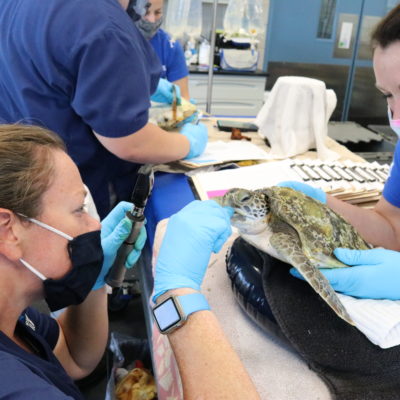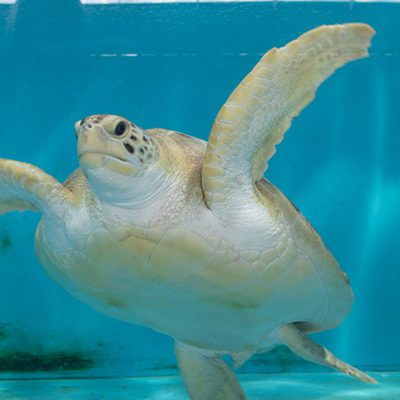Press Room
TAMPA, FL (February 3, 2025) – During a routine annual exam, Dominica, a cownose stingray, was diagnosed with chronic lymphocytic leukemia. Thanks to the dedicated care of The Florida Aquarium’s veterinarians and animal care teams, the cancer was detected early and successfully managed for years. This rare case underscores the vital role of proactive health monitoring in ensuring the wellbeing of marine life.
“Our animals can’t tell us how they feel, so we rely on their behavior, appetite, and routine medical exams to ensure they are healthy,” said Anna Garcia, Senior Biologist at The Florida Aquarium. “Annual exams allow us to detect potential issues early, just like in human medicine.”
CLICK HERE TO DOWNLOAD BROADCAST-QUALITY
VIDEO AND PHOTOS OF DOMINICA’S CARE + SOUND
Courtesy: The Florida Aquarium
Dr. Lindsey Waxman, The Florida Aquarium’s Staff Veterinarian, recalled the unexpected findings that led to Dominica’s diagnosis. “We initially ran blood work to check on a past issue with anemia, but what we found was staggering. Dominica’s white blood cell count was 10 times higher than normal, indicating a serious underlying condition. Further tests confirmed she had chronic lymphocytic leukemia, making her case only the second reported instance of this cancer in a cownose ray.”
Since her diagnosis, Dominica has been carefully monitored and treated with steroids and dietary adjustments. Over time, her condition has remained stable, allowing for a reduction in the frequency of medical interventions.
“We’ve been able to manage her condition with long-term medical care, and she’s doing absolutely amazing,” Dr. Waxman said. “This case also helps dispel the myth that sharks and rays can’t get cancer. While rare, it does happen, and Dominica’s story highlights the importance of veterinary science in marine life conservation.”
The knowledge gained from treating Dominica extends beyond The Florida Aquarium. “The data we’ve collected can help guide other zoos and aquariums in diagnosing and treating similar cases,” Garcia added. “This is the essence of what AZA-accredited facilities do—we contribute to a global understanding of animal health and welfare.”
Dominica continues to thrive under the care of The Florida Aquarium’s dedicated team, serving as a testament to the power of early detection and the importance of ongoing veterinary research in marine life preservation.
The Florida Aquarium is proud to share Dominica’s story in recognition of World Cancer Day, an international day observed on February 4th to raise awareness of cancer and promote its prevention, detection, and treatment. This year’s theme, United by Unique, provides an opportunity to unite the world in the fight against cancer and reduce preventable suffering. Dominica’s unique case serves as a reminder that cancer can affect all species, and early detection is critical in improving outcomes for both animals and people.
Much like critical care human patients in hospitals, every animal at The Florida Aquarium receives personalized medical care—including examinations, X-rays, bloodwork, treatments, and medications. To support The Florida Aquarium’s ongoing care for marine life, click here.
Contact The Florida Aquarium communications@flaquarium.org
More
to Sea

Florida Aquarium Rallies for Endangered Sea T...
It was a record-setting event for The Florida Aquarium when the team of animal care professionals admitted 17 sea turtles to the Sea Turtle Rehabilitation Center at the Center for Conservation campus ...
Read More
Threatened Green Sea Turtle Makes New Home at...
In 2016, The Florida Aquarium’s animal care team took in Banner, a threatened green sea turtle. After four years of rehabilitation and care, Banner has successfully made the 600-mile trek up the Gul...
Read More